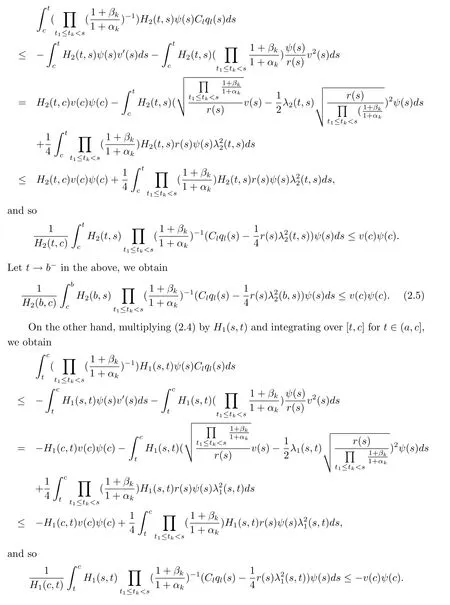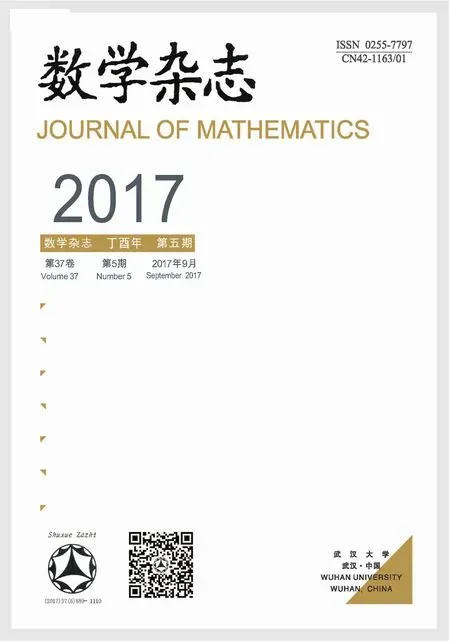OSCILLATION OF NONLINEAR IMPULSIVE DELAY HYPERBOLIC EQUATION WITH FUNCTIONAL ARGUMENTS VIA RICCATI METHOD
ZOU Min,CHEN Rong-san,LIU An-ping
(School of Mathematics and Physics,China University of Geosciences,Wuhan 430074,China)
OSCILLATION OF NONLINEAR IMPULSIVE DELAY HYPERBOLIC EQUATION WITH FUNCTIONAL ARGUMENTS VIA RICCATI METHOD
ZOU Min,CHEN Rong-san,LIU An-ping
(School of Mathematics and Physics,China University of Geosciences,Wuhan 430074,China)
In this paper,we mainly deal with the oscillation problems of nonlinear impulsive hyperbolic equation with functional arguments.By using integral averaging method and a generalized Riccati technique,a sufficient condition for oscillation of the solutions of nonlinear impulsive hyperbolic equation with functional arguments is obtained.We can make better use of some existing conclusions about oscillation of the solutions of impulsive ordinary dif f erential equations with delay.
oscillation;impulsive;delay;hyperbolic equation;Riccati inequality
1 Introduction
The theories of nonlinear partial functional di ff erential equations are applied in many fi elds.In recent years the research of oscillation to impulsive partial di ff erential systems caught more and more attention.In this paper,we study the oscillation properties of the solutions to impulsive delay hyperbolic equation

The following is the boundary conditionwhere G is a bounded domain of Rnwith the smooth boundary∂G and n is the unit exterior normal vector to∂G.

Following are the basic hypothesis
(H1)r(t)∈C([0,+∞);(0,+∞)),a(t),bi(t)∈PC([0,+∞);[0,+∞)),i=1,2,···,n.j=1,2,···,m,where PC denotes the class of functions which are piecewise continuous in t with discontinuities of the fi rst kind only at t=tk,k=1,2,···.
(H2)τi(t)∈C([0,+∞);R)=+∞,i=1,2,···,n.
(H3)h(u),hi(u)∈C(R,R),uh(u)≥0,uh′(u)≥0,≥0,i=1,2,···,n;φj(s)∈C(R,R),=const.>0 for s 6=0.αk,βk=const.>-1,0<t1<t2<···<tk<
We introduce the notations
De fi nition 1.1The solution u(x,t)of the problems(1.1)-(1.4)is said to be nonoscillatory in domain Ω if it is either eventually positive or eventually negative.Otherwise,it is called oscillatory.
Def i nition 1.2We say that functions Hi,i=1,2,belong to a function class H,if Hi∈C(D;[0,+∞)),i=1,2,satisfy
1.Hi(t,s)=0,i=1,2 for t=s, 2.Hi(t,s)>0,i=1,2 for t>s,
where D={(t,s):0<s≤t<+∞}.Moreover,the partial derivatives∂H1/∂s and∂H2/∂s exist on D such that

where h1,h2∈Cloc(D;R).
In recent years,there was much research activity concerning the oscillation theory of nonlinear hyperbolic equations with functional arguments by employing Riccati technique. Riccati techniques were used to obtain various oscillation results.Recently,Shoukaku and Yoshida[2]derived oscillation criteria by using oscillation criteria of Riccati inequality.In this work,we study the hyperbolic equation with impulsive.
2 Main Results
Theorem 2.1If for each T≥0,there exist(H1,H2)∈H and a,b,c∈R such that T≤a<c<b and

then every solution of the problems(1.1)-(1.4)oscillates in Ω,where

ProofSuppose to the contrary that there is a nonoscillatory solution u(x,t)of the problems(1.1)-(1.4).Without loss of generality we may assume that u(x,t)>0 in G× [t0,+∞)for some t0>0 because the case where u(x,t)<0 can be treated similarly.Since (H2)holds,we see that u(x,τi(t))>0(i=1,2,···n)in G×[t1,+∞)for some t1≥t0.
(1)For t≥t1,t 6=tk,k=1,2,···,integrating(1)with respect to x over G,we obtain
that is

Thus we obtain that the functions U(t)is a eventually positive solution of the impulsive dif f erential inequality

Multiplying(2.4)by H2(t,s)and integrating over[c,t]for t∈[c,b),we have


which contradicts condition(2.1).
[1]Lakshmikantham V,Bainov D,Simeonov P S.Theory of impulsive dif f erential equations[M].Singapore:World Scientif i c,1989.
[2]Yutaka Shoukaku,Norio Yoshida.Oscillations of nonlinear hyperbolic equations with functional arguments via Riccati method[J].Appl.Math.Comput.,2010,217:143-151.
[3]Luo Zhiguo,Shen Jianhua.Oscillations of second linear dif f erential equations with impulses[J].Appl. Math.Lett.,2007,20:75-81.
[4]Bainov D D,Minchev E.Oscillation of the solutions of impulsive parabolic equations[J].J.Comput. Appl.Math.,1996,69:207-214.
[5]Liu Anping,Liu Ting,Zou Min.Oscillation of nonlinear impulsive parabolic dif f erential equations of neutral type[J].Rocky Mount.J.Math.,2011,41:833-850.
[6]Chen Rongsan,Zou Min,Liu Anping.Comparison of several numerical schemes for scalar linear advaction equation[J].J.Math.,2015,35(4):977-982.
里卡蒂方法研究带泛函参数的非线性脉冲时滞双曲方程的振动性
邹敏,陈荣三,刘安平
(中国地质大学(武汉)数学与物理学院,湖北武汉430074)
本文研究了带泛函参数的非线性脉冲时滞双曲方程的振动性问题.利用积分平均法和里卡蒂方法得到了这类方程解的振动性的一个充分条件,对非线性时滞双曲方程解的震动性进行了推广,能更好地利用一些现有的脉冲时滞常微分方程解的振动性的结论.
振动;脉冲;时滞;双曲方程;Riccati不等式
O175.27
A
0255-7797(2017)05-1007-06
∗Received date:2015-11-25Accepted date:2016-03-04
Supported by National Natural Science Foundation of China(11201436).
Biography:Zou min(1981-),female,born at Xiantao,Hubei,lecturer,major in partial dif f erential equation.
2010 MR Subject Classif i cation:58J45;35B05
- 数学杂志的其它文章
- BIFURCATION IN A RATIO-DEPENDENT PREDATOR-PREY SYSTEM WITH STAGE-STRUCTURED IN THE PREY POPULATION
- FORCING AN ω1-REAL WITHOUT ADDING A REAL
- 组织特异性蛋白质复合体的识别
- 面板数据分位数回归模型的参数估计与变量选择
- ON A NEW NONTRIVIAL ELEMENT INVOLVING THE THIRD PERIODICITY γ-FAMILY IN π∗S
- CONVERGENCE THEORY ON QUASI-PROBABILITY MEASURE

